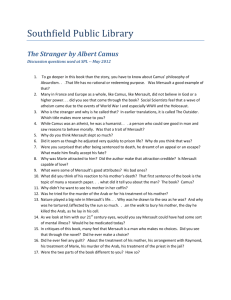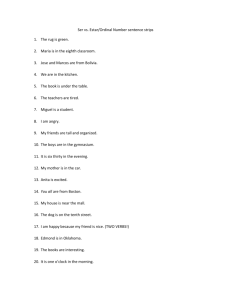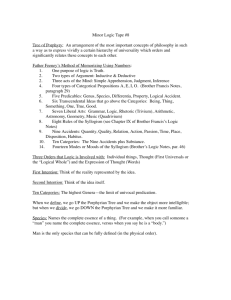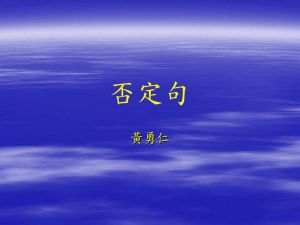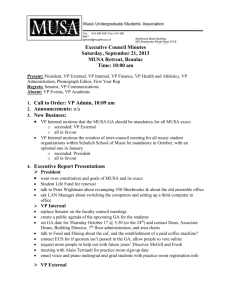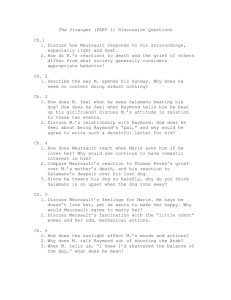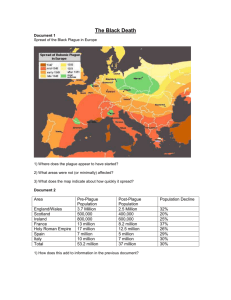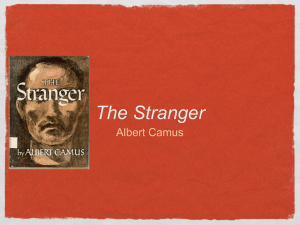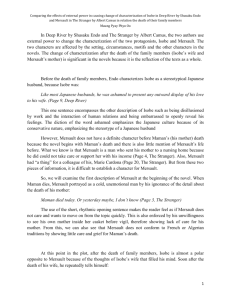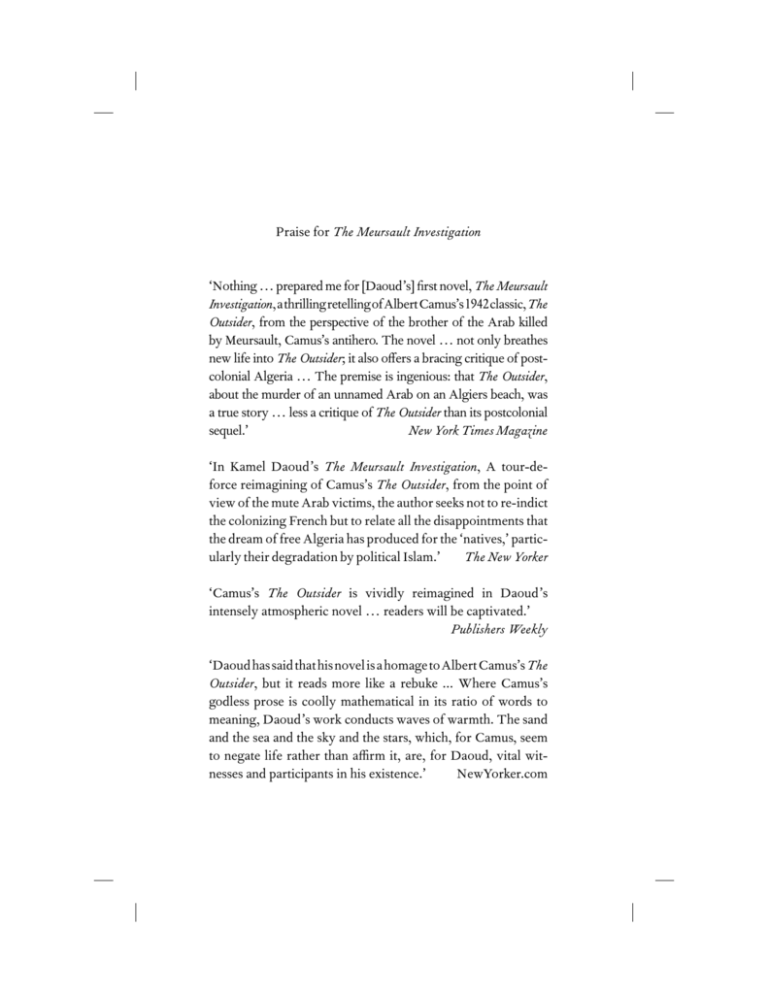
Praise for The Meursault Investigation
‘Nothing … prepared me for [Daoud’s] first novel, The Meursault
Investigation, a thrilling retelling of Albert Camus’s 1942 classic, The
Outsider, from the perspective of the brother of the Arab killed
by Meursault, Camus’s antihero. The novel … not only breathes
new life into The Outsider; it also offers a bracing critique of postcolonial Algeria … The premise is ingenious: that The Outsider,
about the murder of an unnamed Arab on an Algiers beach, was
a true story … less a critique of The Outsider than its postcolonial
sequel.’
New York Times Magazine
‘In Kamel Daoud’s The Meursault Investigation, A tour-deforce reimagining of Camus’s The Outsider, from the point of
view of the mute Arab victims, the author seeks not to re-indict
the colonizing French but to relate all the disappointments that
the dream of free Algeria has produced for the ‘natives,’ particularly their degradation by political Islam.’ The New Yorker
‘Camus’s The Outsider is vividly reimagined in Daoud’s
intensely atmospheric novel … readers will be captivated.’ Publishers Weekly
‘Daoud has said that his novel is a homage to Albert Camus’s The
Outsider, but it reads more like a rebuke ... Where Camus’s
godless prose is coolly mathematical in its ratio of words to
meaning, Daoud’s work conducts waves of warmth. The sand
and the sea and the sky and the stars, which, for Camus, seem
to negate life rather than affirm it, are, for Daoud, vital witnesses and participants in his existence.’ NewYorker.com
‘For Daoud, the novel is above all an opportunity to engage
with the legacy of Algerian independence, half a century old,
and to ask what the country has made of its liberation. Daoud
turns the novel into an aesthetic platform for his particular
sense of the Algerian absurd: the tyranny of official religion
and an asphyxiating national history.’
The Nation
‘Very beautiful writing, original, located between suppressed
anger and bursts of elation.’ Les Echos
‘The nameless Arab victim of Albert Camus’s The Outsider receives a biography and a name in this thoughtful, controversial
rejoinder from the other side of the colonial question … Fiction
with a strong moral edge, offering a Rashomon-like response
to a classic novel.’
Kirkus Reviews
‘A remarkable homage to its model.’ Le Nouvel Observateur
‘A breathtaking and effectively realized novel. The Outsider becomes a palindrome ... The Meursault Investigation approaches
the incredible, in that it reverses the perspective and point of
view not without an emphatic ferociousness, all while playing
with the prose and perspective of The Outsider.’ La Croix
‘An intense and surprising story.’ La Montagne
The
Meursault
Investigation
Kamel Daoud
TRA NS LAT E D F R O M T H E F R E N C H
B Y J O H N C U LLE N
Mersault UK text.indd iii
29/04/2015 10:26:41
A Oneworld Book
First published in English in Great Britain & Australia by Oneworld Publications, 2015
Originally published in French as Meursault, contre-enquête by Éditions Barzakh
in Algeria in 2013, and by Actes Sud in France in 2014
Copyright © Actes Sud, 2014
English translation © John Cullen 2015
The moral right of Kamel Daoud to be identified as the author
of this work has been asserted by him in accordance
with the Copyright, Designs and Patents Act 1988
All rights reserved
Copyright under Berne Convention
A CIP record for this title is available from the British Library
ISBN 978-1-78074-839-9
ISBN 978-1-78074-840-5 (eBook)
An excerpt from this novel was first published in the April 6, 2015 issue of The New Yorker.
The author has quoted and occasionally adapted certain passages from The Stranger by
Albert Camus, translated by Matthew Ward (New York: Alfred A. Knopf, 1988).
The lyrics on pages 55-56 are from “Malou Khouya” by Khaled.
Printed and bound by CPI Group (UK) Ltd, Croydon, CR0 4YY
Text designer: Julie Fry
This book is a work of fiction. Names, characters, businesses, organisations,
places and events are either the product of the author’s imagination
or are used fictitiously. Any resemblance to actual persons,
living or dead, events or locales is entirely coincidental.
Oneworld Publications
10 Bloomsbury Street
London WC1B 3SR
England
This book has been selected to receive financial assistance from English PEN’s Writers in
Translation programme supported by Bloomberg. English PEN exists to promote literature
and its understanding, uphold writers’ freedoms around the world, campaign against the
persecution and imprisonment of writers for stating their views, and promote the friendly
co-operation of writers and free exchange of ideas. www.englishpen.org
Mersault UK text.indd iv
29/04/2015 10:26:41
For Aïda.
For Ikbel.
My open eyes.
Mersault UK text.indd v
29/04/2015 10:26:41
Mersault pages_06.indd vi
3/27/15 12:26 PM
The hour of crime does not strike at the
same time for every people. This
explains the permanence of history.
— E. M. CIORAN
Syllogismes de l’amertume
Mersault pages_06.indd vii
3/27/15 12:26 PM
Mersault pages_06.indd viii
3/27/15 12:26 PM
I
Mama’s still alive today.
She doesn’t say anything now, but there are many tales
she could tell. Unlike me: I’ve rehashed this story in my
head so often, I almost can’t remember it anymore.
I mean, it goes back more than half a century. It happened, and everyone talked about it. People still do,
but they mention only one dead man, they feel no compunction about doing that, even though there were two
of them, two dead men. Yes, two. Why does the other
one get left out? Well, the original guy was such a good
storyteller, he managed to make people forget his crime,
whereas the other one was a poor illiterate God created
apparently for the sole purpose of taking a bullet and
returning to dust — an anonymous person who didn’t
even have the time to be given a name.
I’ll tell you this up front: The other dead man, the murder victim, was my brother. There’s nothing left of him.
There’s only me, left to speak in his place, sitting in this
bar, waiting for condolences no one’s ever going to offer.
Laugh if you want, but this is more or less my mission: I
peddle offstage silence, trying to sell my story while the
theater empties out. As a matter of fact, that’s the reason
why I’ve learned to speak this language, and to write it
too: so I can speak in the place of a dead man, so I can finish his sentences for him. The murderer got famous, and
1
Mersault pages_06.indd 1
3/27/15 12:26 PM
his story’s too well written for me to get any ideas about
imitating him. He wrote in his own language. Therefore
I’m going to do what was done in this country after Independence: I’m going to take the stones from the old houses
the colonists left behind, remove them one by one, and
build my own house, my own language. The murderer’s
words and expressions are my unclaimed goods. Besides,
the country’s littered with words that don’t belong to anyone anymore. You see them on the façades of old stores, in
yellowing books, on people’s faces, or transformed by the
strange creole decolonization produces.
So it’s been quite some time since the murderer died,
and much too long since my brother ceased to exist for
everyone but me. I know, you’re eager to ask the type of
questions I hate, but please listen to me instead, please give
me your attention, and by and by you’ll understand. This
is no normal story. It’s a story that begins at the end and
goes back to the beginning. Yes, like a school of salmon
swimming upstream. I’m sure you’re like everyone else,
you’ve read the tale as told by the man who wrote it. He
writes so well that his words are like precious stones, jewels cut with the utmost precision. A man very strict about
shades of meaning, your hero was; he practically required
them to be mathematical. Endless calculations, based on
gems and minerals. Have you seen the way he writes?
He’s writing about a gunshot, and he makes it sound like
poetry! His world is clean, clear, exact, honed by morning
sunlight, enhanced with fragrances and horizons. The
only shadow is cast by “the Arabs,” blurred, incongruous
objects left over from “days gone by,” like ghosts, with
no language except the sound of a flute. I tell myself he
2
Mersault pages_06.indd 2
3/27/15 12:26 PM
must have been fed up with wandering around in circles
in a country that wanted nothing to do with him, whether
dead or alive. The murder he committed seems like the
act of a disappointed lover unable to possess the land he
loves. How he must have suffered, poor man! To be the
child of a place that never gave you birth . . .
I too have read his version of the facts. Like you
and millions of others. And everyone got the picture,
right from the start: He had a man’s name; my brother
had the name of an incident. He could have called him
“Two P.M.,” like that other writer who called his black
man “Friday.” An hour of the day instead of a day of the
week. Two in the afternoon, that’s good. Zujj in Algerian Arabic, two, the pair, him and me, the unlikeliest
twins, somehow, for those who know the story of the
story. A brief Arab, technically ephemeral, who lived
for two hours and has died incessantly for seventy years,
long after his funeral. It’s like my brother Zujj has been
kept under glass. And even though he was a murder victim, he’s always given some vague designation, complete
with reference to the two hands of a clock, over and over
again, so that he replays his own death, killed by a bullet
fired by a Frenchman who just didn’t know what to do
with his day and with the rest of the world, which he carried on his back.
And again! Whenever I go over this story in my head,
I get angry — at least, I do whenever I have the strength.
So the Frenchman plays the dead man and goes on and
on about how he lost his mother, and then about how he
lost his body in the sun, and then about how he lost a girlfriend’s body, and then about how he went to church and
3
Mersault pages_06.indd 3
3/27/15 12:26 PM
discovered that his God had deserted the human body,
and then about how he sat up with his mother’s corpse
and his own, et cetera. Good God, how can you kill
someone and then take even his own death away from
him? My brother was the one who got shot, not him! It
was Musa, not Meursault, see? There’s something I find
stunning, and it’s that nobody — not even after Independence — nobody at all ever tried to fi nd out what the
victim’s name was, or where he lived, or what family he
came from, or whether he had children. Nobody. Everyone was knocked out by the perfect prose, by language
capable of giving air facets like diamonds, and everyone
declared their empathy with the murderer’s solitude and
offered him their most learned condolences. Who knows
Musa’s name today? Who knows what river carried him
to the sea, which he had to cross on foot, alone, without
his people, without a magic staff? Who knows whether
Musa had a gun, a philosophy, or a sunstroke?
Who was Musa? He was my brother. That’s what I’m
getting at. I want to tell you the story Musa was never
able to tell. When you opened the door of this bar, you
opened a grave, my young friend. Do you happen to have
the book in your schoolbag there? Good. Play the disciple and read me the first page or so . . .
So. Did you understand? No? I’ll explain it to you.
After his mother dies, this man, this murderer, finds himself without a country and falls into idleness and absurdity. He’s a Robinson Crusoe who thinks he can change
his destiny by killing his Friday but instead discovers
he’s trapped on an island and starts banging on like a
self-indulgent parrot. “Poor Meursault, where are you?”
4
Mersault pages_06.indd 4
3/27/15 12:26 PM
Shout out those words a few times and they’ll seem less
ridiculous, I promise. And I’m asking that question for
your sake. I know the book by heart, I can recite it to
you like the Koran. That story — a corpse wrote it, not
a writer. You can tell by the way he suffers from the sun
and gets dazzled by colors and has no opinion on anything except the sun, the sea, and the surrounding rocks.
From the very beginning, you can sense that he’s looking for my brother. And in fact, he seeks him out, not so
much to meet him as to never have to. What hurts me
every time I think about it is that he killed him by passing
over him, not by shooting him. You know, his crime is
majestically nonchalant. It made any subsequent attempt
to present my brother as a shahid, a martyr, impossible.
The martyr came too long after the murder. In the interval, my brother rotted in his grave and the book obtained
its well-known success. And afterward, therefore, everybody bent over backward to prove there was no murder,
just sunstroke.
Ha, ha! What are you drinking? In these parts, you
get offered the best liquors after your death, not before.
And that’s religion, my brother. Drink up — in a few
years, after the end of the world, the only bar still open
will be in Paradise.
I’m going to outline the story before I tell it to you. A
man who knows how to write kills an Arab who, on the
day he dies, doesn’t even have a name, as if he’d hung
it on a nail somewhere before stepping onto the stage.
Then the man begins to explain that his act was the fault
of a God who doesn’t exist and that he did it because of
what he’d just realized in the sun and because the sea salt
5
Mersault pages_06.indd 5
3/27/15 12:26 PM
obliged him to shut his eyes. All of a sudden, the murder
is a deed committed with absolute impunity and wasn’t
a crime anyway because there’s no law between noon
and two o’clock, between him and Zujj, between Meursault and Musa. And for seventy years now, everyone has
joined in to disappear the victim’s body quickly and turn
the place where the murder was committed into an intangible museum. What does “Meursault” mean? Meurt seul,
dies alone? Meurt sot, dies a fool? Never dies? My poor
brother had no say in this story. And that’s where you go
wrong, you and all your predecessors. The absurd is what
my brother and I carry on our backs or in the bowels of
our land, not what the other was or did. Please understand me, I’m not speaking in either sorrow or anger. I’m
not even going to play the mourner. It’s just that . . . it’s
just what? I don’t know. I think I’d just like justice to be
done. That may seem ridiculous at my age . . . But I swear
it’s true. I don’t mean the justice of the courts, I mean the
justice that comes when the scales are balanced. And I’ve
got another reason besides: I want to pass away without
being pursued by a ghost. I think I can guess why people
write true stories. Not to make themselves famous but to
make themselves more invisible, and all the while clamoring for a piece of the world’s true core.
Drink up and look out the window — you’d think this
country was an aquarium. Right, right, but it’s your fault
too, my friend; your curiosity provokes me. I’ve been
waiting for you for years, and if I can’t write my book, at
least I can tell you the story, can’t I? A man who’s drinking is always dreaming about a man who’ll listen. That’s
today’s bit of wisdom, write it down in your notebook . . .
6
Mersault pages_06.indd 6
3/27/15 12:26 PM
It’s simple: The story we’re talking about should be
rewritten, in the same language, but from right to left.
That is, starting when the Arab’s body was still alive,
going down the narrow streets that led to his demise, giving him a name, right up until the bullet hit him. So one
reason for learning this language was to tell this story for
my brother, the friend of the sun. Seems unlikely to you?
You’re wrong. I had to find the response nobody wanted
to give me when I needed it. You drink a language, you
speak a language, and one day it owns you; and from
then on, it falls into the habit of grasping things in your
place, it takes over your mouth like a lover’s voracious
kiss. I knew someone who learned to write in French
because one day his illiterate father received a telegram
no one could decipher. This was in the days when your
hero was still alive and the colonists were still running
the show. The telegram lay rotting in this fellow’s pocket
for a week before somebody read it to him. In three lines,
it informed him of his mother’s death, somewhere deep
in the treeless country. He told me, “I learned to write
for my father, and I learned to write so that such a thing
could never happen again. I’ll never forget his anger with
himself, and his eyes begging me to help him.” Basically,
my reason’s the same as his. Well, go on, read some more,
even if the whole thing’s written in my head. Every night,
my brother Musa, alias Zujj, arises from the Realm of
the Dead and pulls my beard and cries, “Oh my brother
Harun, why did you let this happen? I’m not a sacrificial
lamb, damn it, I’m your brother!” Go on, read!
Let’s be clear from the start: There were just two siblings, my brother and me. We didn’t have a sister, much
7
Mersault pages_06.indd 7
3/27/15 12:26 PM
less a slutty one, as your hero suggested in his book. Musa
was my older brother, his head seemed to strike the clouds.
He was quite tall, yes, and his body was thin and knotty
from hunger and the strength anger gives. He had an
angular face, big hands that protected me, and hard eyes
because our ancestors lost their land. But when I think
about it, I believe he already loved us then the way the
dead do, with a look in his eyes that came from the hereafter and with no useless words. I don’t have many pictures
of him in my head, but I want to describe them to you
carefully. For example, the day he came home early from
the neighborhood market, or maybe from the port, where
he worked as a porter and handyman, toting, dragging,
lifting, sweating. Anyway, that day he came across me
while I was playing with an old tire, and he put me on his
shoulders and told me to hold on to his ears, as if his head
were a steering wheel. I remember how ecstatic I felt while
he rolled the tire along and made a sound like a motor. His
smell comes back to me too, a persistent mingling of rotten
vegetables, sweat, muscles, and breath. Another picture in
my memory is from the day of Eid one year. He’d given me
a hiding the day before for some stupid thing I’d done and
now we were both embarrassed. It was a day of forgiveness, he was supposed to kiss me, but I didn’t want him
to lose face and lower himself by apologizing to me, not
even in God’s name. I also remember his gift for immobility, the way he’d stand stock-still on the threshold of our
house, facing the neighbors’ wall, holding a cigarette and
the cup of black coffee our mother would bring him.
Our father had disappeared ages before, reduced
to fragments by the rumors of people who claimed to
8
Mersault pages_06.indd 8
3/27/15 12:26 PM
have run into him in France, and only Musa could hear
his voice. He’d give Musa commands in his dreams, and
Musa would relay them to us. My brother had seen him
again only once since he’d left, and from such a distance
that he wasn’t really sure it was him anyway. As a child,
I knew how to distinguish the days with rumors from the
days without. When my brother Musa would hear people
talk about my father, he’d come home, all feverish gestures and burning eyes, and then he and Mama would
have long, whispered conversations that always ended
in heated arguments. I was excluded from those, but I
got the gist: For some obscure reason, my brother held a
grudge against Mama, and she defended herself in a way
that was even more obscure. Those were unsettling days
and nights, filled with anger, and I recall my panic at the
idea that Musa might leave us too. But he’d always return
at dawn, drunk, oddly proud of his rebellion, seemingly
endowed with renewed strength. Then my brother Musa
would sober up and fade away. All he wanted to do was
sleep, and so my mother would get him under her control
again. I’ve got some pictures in my head, they’re all I can
offer you. A cup of coffee, some cigarette butts, his espadrilles, Mama crying and then recovering very quickly
to smile at a neighbor who’d come to borrow some tea
or spices, moving from distress to courtesy so fast it
made me doubt her sincerity, young as I was. Everything
revolved around Musa, and Musa revolved around our
father, whom I never knew and who left me nothing but
our family name. Do you know what we were called in
those days? Uled el-assas, the sons of the guardian. Of
the watchman, to be more precise. My father worked as
9
Mersault pages_06.indd 9
3/27/15 12:26 PM
a night watchman in a factory where they made I don’t
know what. One night, he disappeared. And that’s all.
That’s the story I got. It happened in the 1930s, right after
I was born. That’s why I always imagine him gloomy,
wrapped up in a coat or a black djellaba, crouching in
some dim corner, and silent, without so much as a single
answer for me.
So Musa was a simple god, a god of few words. His
thick beard and strong arms made him seem like a giant
who could have wrung the neck of any soldier in any
ancient pharaoh’s army. Which explains why, on the day
when we learned of his death and the circumstances surrounding it, I didn’t feel sad or angry at first; instead I
felt disappointed and offended, as if someone had insulted
me. My brother Musa was capable of parting the sea, and
yet he died in insignificance, like a common bit player,
on a beach that today has disappeared, close to the waves
that should have made him famous forever!
I almost never wept for him, I just stopped looking
at the sky the way I used to. Moreover, in later years, I
didn’t even fight in the War of Liberation. I knew it was
won in advance, from the moment when a member of my
family was killed because someone felt lethargic from too
much sun. As soon as I learned to read and write, everything became clear to me: I had my mother, while Meursault had lost his. He killed, but I knew it was really a way
of committing suicide. Now, it’s true that I reached those
conclusions before the scenery got shifted and the roles
reversed. Before I realized how alike we were, he and I,
imprisoned in the same cell, shut up out of sight in a place
where bodies were nothing but costumes.
10
Mersault pages_06.indd 10
3/27/15 12:26 PM
And so the story of this murder doesn’t begin with the
famous sentence “Maman died today” but with words no
one has ever heard, spoken by my brother Musa to my
mother on that last day, right before he went out: “I’ll be
home earlier than usual.” It was a day, as I recall, without. Remember what I told you about my world and its
binary calendar: the days with rumors about my father,
and the days without, which Musa dedicated to smoking,
arguing with Mama, and looking at me like a piece of furniture requiring nourishment. In reality, as I now realize,
I did what Musa had done; he’d replaced my father, and I
replaced my brother. But wait, I’m lying to you about that,
just as for a long time I lied to myself. The truth is that
Independence only pushed people on both sides to switch
roles. We were the ghosts in this country when the settlers
were exploiting it and bestowing on it their church bells
and cypress trees and swans. And today? Well, it’s just
the opposite! They come back sometimes, holding their
descendants’ hands on trips organized for pieds-noirs or
for people affected by their parents’ nostalgia, trying to
fi nd a street or a house or a tree with initials carved in
its trunk. I recently saw a group of French tourists standing in front of a tobacco shop at the airport. Like discreet,
mute specters, they watched us — us Arabs — in silence, as
if we were nothing but stones or dead trees. Nevertheless,
that’s all over now. That’s what their silence said.
I maintain that when you’re investigating a crime,
you must keep in mind its essential elements: Who’s the
dead man? Who was he? I want you to make a note of my
brother’s name, because he was the one who was killed
in the first place and the one who’s still being killed to
11
Mersault pages_06.indd 11
3/27/15 12:26 PM
this day. I insist on that, because otherwise, we may as
well part right here. You carry off your book, I’ll take up
the body, and to each his way. The genealogy I’m talking about is pretty pathetic in any case! I’m the son of
the guardian, uld el-assas, and the Arab’s brother. Here
in Oran, you know, people are obsessed with origins.
Uled el-bled, the real children of the city, of the country. Everyone wants to be this city’s only son, the first,
the last, the oldest. The bastard’s anxiety — sounds like
there’s some of that rattling around, don’t you think?
Everyone tries to prove he was the first — him, his father,
or his grandfather — to live here. All the others are foreigners, landless peasants ennobled en masse by Independence. I’ve always wondered why people like that poke
about so anxiously in cemeteries. Yes, yes they do. Maybe
it’s from fear, or from the scramble for property. The first
people to have lived here? Confirmed skeptics or recent
newcomers call them “the rats.” This is a city with its legs
spread open toward the sea. Take a look at the port when
you walk down toward the old neighborhoods in Sidi El
Houari, over on the Calère des Espagnols side. It’s like
an old whore, nostalgic and chatty. Sometimes I go down
to the lush garden on the Promenade de Létang to have a
solitary drink and rub shoulders with delinquents. Yes,
down there, where you see that strange, dense vegetation,
ficuses, conifers, aloes, not to mention palms and other
deeply rooted trees, growing up toward the sky as well
as down under the earth. Below there’s a vast labyrinth
of Spanish and Turkish galleries, which I’ve been able to
visit, even though they’re usually closed. I saw an astonishing spectacle down there: the roots of centuries-old
12
Mersault pages_06.indd 12
3/27/15 12:26 PM
trees, seen from the inside, so to speak, gigantic, twisting
things, like giant, naked, suspended flowers. Go and visit
that garden. I love the place, but sometimes when I’m
there I detect the scent of a woman’s sex, a giant, wornout one. Which goes a little way toward confirming my
obscene vision: This city faces the sea with its legs apart,
its thighs spread, from the bay to the high ground where
that luxurious, fragrant garden is. It was conceived — or
should I say inseminated, ha, ha! — by a general, General
Létang, in 1847. You absolutely must go and see it — then
you’ll understand why people here are dying to have
famous ancestors. To escape from the evidence.
Have you noted it down? My brother’s name was
Musa. He had a name. But he’ll remain “the Arab” forever. The last on the list, excluded from the inventory that
Crusoe of yours made. Strange, isn’t it? For centuries,
the settler increases his fortune, giving names to whatever he appropriates and taking them away from whatever makes him feel uncomfortable. If he calls my brother
“the Arab,” it’s so he can kill him the way one kills time,
by strolling around aimlessly. For your guidance, I’ll
tell you that for years after Independence, Mama fought
to be awarded a pension as the mother of a martyr. As
you can imagine, she never got it, and why not, if you
please? Because it was impossible to prove the Arab was a
son — and a brother. Impossible to prove he existed, even
though he was killed in public. Impossible to fi nd and
confirm a connection between Musa and Musa, between
Musa and himself! How can you tell the world about
that when you don’t know how to write books? Mama
wore herself out for a while in the first few months after
13
Mersault pages_06.indd 13
3/27/15 12:26 PM
Independence, trying to gather signatures or witnesses,
but in vain. Nothing was left of Musa, not even a corpse!
Musa, Musa, Musa . . . I like to repeat that name from
time to time so it doesn’t disappear. I insist on that, and I
want you to write it in big letters. Half a century after his
birth and death, a man has just been given a name. I insist.
No, the first night I always pick up the tab. By the
way, what’s your name?
14
Mersault pages_06.indd 14
3/27/15 12:26 PM

